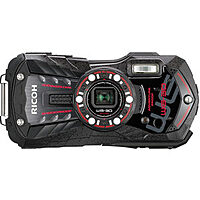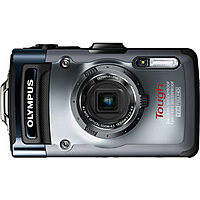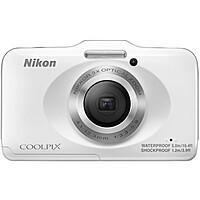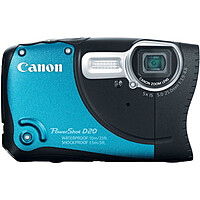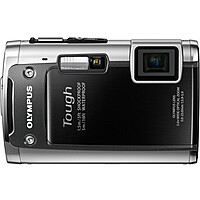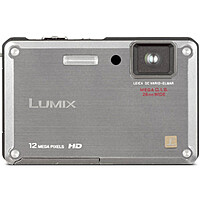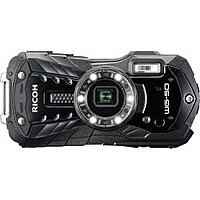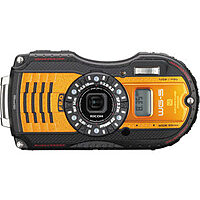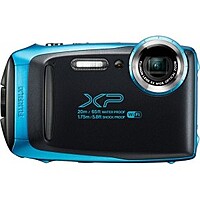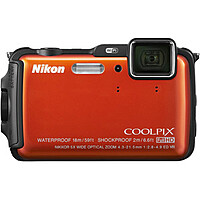Olympus TG-610 with Ricoh WG-5 GPS Overview
Let's compare Ricoh WG-5 GPS with Olympus TG-610.
These models are included in the Waterproof cameras.
Ricoh WG-5 GPS was released in 2015, and Olympus TG-610 in 2011.
WG-5 GPS is newer, which is a plus. TG-610 4 years older.
4 years, this is a pretty big age difference.
The sensor resolution of WG-5 GPS is greater than that of TG-610. However, the difference of 2 MP is not very significant.
The more megapixels the camera has, the more detailed and clear the picture will be. The number of megapixels will also affect the maximum size of the photos, which then can be printed without loss of quality.
At the first camera (WG-5 GPS), the minimum ISO value is lower, which gives more opportunities for shooting in daylight.
A larger maximum ISO allows you to take good pictures in the dark.
At Ricoh WG-5 GPS, the maximum ISO is greater by 4800.
Both cameras have Sensor-shift image stabilization.
Both cameras feature a 3-inch fixed screen.
Burst mode, also called continuous shooting mode, sports mode or continuous high speed mode, is a shooting mode in still cameras. Ricoh WG-5 GPS has 1.0 fps continuous shooting.
Ricoh WG-5 GPS has 1.0 fps continuous shooting.
| General |
WG-5 GPS |
TG-610 |
| Brand |
Ricoh
|
Olympus
|
| Model |
WG-5 GPS |
TG-610 |
| Announced |
February, 2015 |
January, 2011 |
| Body Type |
Compact |
Compact |
| Lens |
| Lens Mount |
fixed lens |
fixed lens |
| Manual Focus |
|
|
| Focal Lens Multiplier |
|
|
| Number of Lenses |
0 |
0 |
| Macro Focus Range |
1 |
3 |
| Screen |
| Screen Size |
3" |
3" |
| Screen Type |
Fixed |
Fixed |
| Screen Resolution |
460k pixels |
920k pixels |
| Touch Screen |
|
|
| Live View |
|
|
| Viewfinder |
| Viewfinder |
None |
None |
| Viewfinder Resolution |
no electronic viewfinder |
| Viewfinder Coverage |
n/a% |
n/a% |
| Viewfinder Magnification |
0.0 |
0.0 |
| Autofocus |
| AF Touch |
|
|
| AF Continuous |
|
|
| AF Single |
|
|
| AF Tracking |
|
|
| AF Selective |
|
|
| AF Center |
|
|
| AF Multi Area |
|
|
| AF Live View |
|
|
| AF Face Detection |
|
|
| AF Contrast Detection |
|
|
| AF Phase Detection |
|
|
| Number of Focus Points |
9 |
0 |
| Number of Cross Focus Points |
0 |
0 |
| Photography Features |
| RAW Support |
|
|
| Min Shutter Speed |
1/4 sec |
1/4 sec |
| Max Shutter Speed |
1/4000 sec |
1/2000 sec |
| Continuous Shooting |
14.0 fps |
1.0 fps |
| Shutter Priority |
|
|
| Aperture Priority |
|
|
| Manual Exposure Mode |
|
|
| Exposure Compensation |
|
|
| Custom White Balance |
|
|
| Image Stabilization |
|
|
| Built-in Flash |
|
|
| Flash Range |
10.40 |
4.20 |
| Flash Modes |
Auto, flash off, flash on, auto + redeye, on + redeye |
Auto, On, Off, Red-Eye, Fill-in |
| External Flash |
|
|
| AE Bracketing |
|
|
| AE Bracketing Range |
±2 EV |
±2 EV |
| WB Bracketing |
|
|
| Sensor |
| Sensor Size |
1/2.3 |
1/2.3 |
| Sensor Type |
BSI-CMOS |
CCD |
| Sensor Dimensions |
6.16 x 4.62 mm |
6.16 x 4.62 mm |
| Sensor Area |
28.5 mm² |
28.5 mm² |
| Sensor Resolution |
16 MP |
14 MP |
| Max Image Resolution |
4608 x 3456 |
4288 x 3216 |
| Max Native ISO |
6400 |
1600 |
| Min Native ISO |
125 |
80 |
| Max Boosted ISO |
0 |
0 |
| Min Boosted ISO |
0 |
0 |
| Video Features |
| 4K |
|
|
| Max Video Resolution |
1920 x 1080 |
1280 x 720 |
| Video Formats |
MPEG-4, H.264 |
Motion JPEG |
| Timelapse Recording |
|
|
| Microphone Port |
|
|
| Headphone Port |
|
|
| Exposure Modes |
| Multi-Segment |
|
|
| Average |
|
|
| Spot |
|
|
| Partial |
|
|
| AF-Area |
|
|
| Center Weighted |
|
|
| Connectivity |
| GPS |
Built-In |
None |
| Wireless Connectivity |
Built-In |
Built-In |
| Bluetooth |
|
|
| HDMI |
|
|
| USB |
USB 2.0 (480 Mbit/sec) |
USB 2.0 (480 Mbit/sec) |
| Battery |
| Battery Life |
240 shots |
210 shots |
| Battery Type |
Battery Pack |
Battery Pack |
| Battery Model |
D-LI92 |
LI-50B |
| Physical |
| Weight |
236 g |
190 g |
| Physical Dimensions |
125 x 65 x 32 mm |
96 x 65 x 26 mm |
| Environmental Sealing |
|
|
| Water Proof |
|
|
| Dust Proof |
|
|
| Shock Proof |
|
|
| Crush Proof |
|
|
| Freeze Proof |
|
|
| Shock Proof |
|
|
| Storage |
| Storage Type |
SD/SDHC/SDXC, internal |
SD/SDHC/SDXC |
| Storage Slots |
1 |
1 |
| Other Features |
| Self Timer |
|
|
| Selfie Friendly |
|
|

